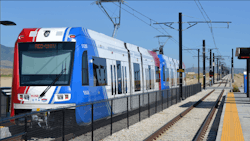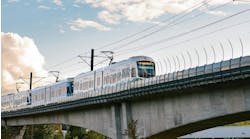FTA could improve rail transit project cost estimate information
A recent analysis performed by the Government Accountability Office (GAO) looked at factors affecting the costs of rail transit projects and determined the Federal Transit Administration (FTA) could improve information on project cost estimates.
GAO says “rail transit projects are inherently complicated, take years to plan and construct, and can cost hundreds of millions to billions of dollars,” which is why project sponsors, including state or local government entities, have a vested interest in controlling those costs.
During its evaluation, GAO said several factors emerged as having an impact on a rail project’s cost estimation including a project’s design decisions, site characteristics, methods utilized to execute the project, general and local market conditions, the community and political environment and legal requirements.
Various approaches used by stakeholders to manage project costs align with key project management principles GAO identified: (1) ensuring management capability; (2) making informed procurement decisions; (3) managing risk; and (4) managing stakeholder relationships.
The FTA’s cost estimating information for sponsors aligns with many best practices, but GAO says FTA’s estimating information does not align with five steps outlined in GAO’s “Cost Estimating and Assessment Guide.” FTA’s information does substantially or fully meet seven of the 12 steps.
“For example, the documents did not discuss sensitivity analyses—an assessment of each factor's effect on cost,” GAO wrote in its report. “Doing so could help sponsors better identify which cost factors are most likely to influence a project's overall costs if assumptions change, thereby improving an estimate's reliability and better informing sponsors' decisions. In addition, sponsors may have difficulty identifying critical cost estimating information because it is distributed across 14 different documents available to sponsors, 11 of which are intended for FTA's oversight contractors. By improving the content and organization of cost estimating information, FTA would help project sponsors increase the reliability of their cost estimates and reduce the risk of cost overruns.”
GAO recommends that FTA should:
- Ensure that FTA's cost estimating information for project sponsors is consistent with all 12 steps found in GAO's “Cost Estimating and Assessment Guide” and needed for developing reliable cost estimates.
- The FTA Administrator should provide a central, easily accessible source with all of FTA's cost estimating information to help project sponsors improve the reliability of their cost estimates.
FTA partially concurred with the first and concurred with the second recommendation. GAO believes FTA should fully implement both recommendations.

Mischa Wanek-Libman | Group Editorial Director
Mischa Wanek-Libman is director of communications with Transdev North America. She has more than 20 years of experience working in the transportation industry covering construction projects, engineering challenges, transit and rail operations and best practices.
Wanek-Libman has held top editorial positions at freight rail and public transportation business-to-business publications including as editor-in-chief and editorial director of Mass Transit from 2018-2024. She has been recognized for editorial excellence through her individual work, as well as for collaborative content.
She is an active member of the American Public Transportation Association's Marketing and Communications Committee and served 14 years as a Board Observer on the National Railroad Construction and Maintenance Association (NRC) Board of Directors.
She is a graduate of Drake University in Des Moines, Iowa, where she earned a Bachelor of Arts degree in Journalism and Mass Communication.

